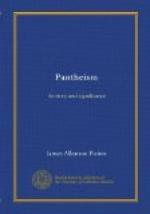And first as to freedom, Spinoza means by this not caprice, nor the monstrous miracle of causeless action, but independence of external force or of any disproportionate and illegitimate passion. The freedom to which he aspires is the freedom of God, who eternally acts in accordance with the mutual harmony of the whole attributes of His nature, not one of which clashes with another. So Spinoza’s free man is one in whom all aspirations and energies, converging in one resultant, the expression of the divine idea, move him in harmony with the Universe. From such a point of view the quibbles about “free will,” in the sense of causeless action, cease to have any meaning. For if the good man says “I could have done otherwise if I had liked,” the obvious reply is, “Yes, but you would not have liked.” Because the will is not a separate faculty, but the expression of the whole nature, as that exists at the moment of “willing.” And the only real freedom is the unimpeded conglomerate impulse to do right. But should it be asked what if the resultant impulse of the whole nature is toward wrong? the answer is, in that case there is no freedom, but a slavery to some external influence or to a disturbed balance of the passions. Or if it be asked what is right? that is a far reaching question to the solution of which Spinoza bends all his splendid powers. But limits of space preclude me from saying more than, that his ideal of right will be found conformable to the highest standards of the most spiritual religions.
[Sidenote: Purity.]
This ideal I ventured to symbolize rather than define as “purity.” For after all the philosophic reasoning with which it is no less lucidly than laboriously worked out in the final book of his Ethica, “Concerning Human. Freedom”—the moral result of all this intellectual effort is that same cleansing of the soul from vain desire and that subordination of the earthly self to its divine idea which we are taught in the Sermon on the Mount. And while surely every one but a fanatical anti-Christian must allow the greater prophetic worth of the Galilean, who could teach these sublime lessons so that “the common people heard him gladly,” it seems difficult to deny to the heretic Jew of the Hague the second rank among the teachers given to the world by that strangely gifted race. For though he could not speak to “the common people,” he left as his legacy to mankind, not so much a system of philosophy, as an impregnable foundation for morals and religion, available for the time now coming upon us—such a time as that suggested by the writer of the Epistle to the Hebrews, when he spoke of “the removing of those things that are shaken, as of things that are made, that those things which cannot be shaken may remain.” No doubt Sir Frederic Pollock is quite right in declaring that Spinoza would have been the very last man to desire any one to become a Spinozist. But that is quite consistent with the inspired Pantheist’s infinite longing to




